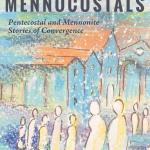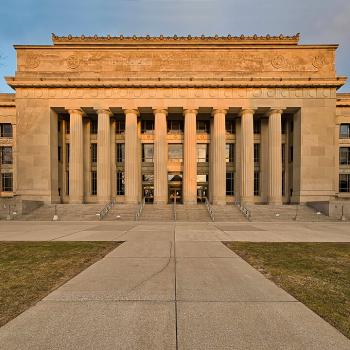After the academic year we just finished, there’s a big part of me that wants to spend the summer doing nothing but grilling, gardening, hiking, and watching baseball games. But today and tomorrow I’ll be back on campus, sitting in a classroom, and participating in a faculty institute. Why would I head right back to Bethel, just a few days after turning in grades?
In part, it’s because it’ll be my first chance to meet in person with colleagues that I haven’t seen much in COVID times, plus a friend who is coming back to Bethel to serve as our keynote speaker. But it’s mostly because the institute’s topic resonates so strongly with me: “The Vocation of the University in an Instrumental Age.”
Vocation is pulling double-duty in that title. If I say that our education is vocational, you’ll assume that this history professor is about to complain that the vast majority of students at Bethel are there not for intellectual, moral, or spiritual formation, but for the instrumental purpose of preparing for employment in a particular job. After all, four of our biggest majors are Business and Accounting, Nursing, Education, and Social Work; our new engineering programs are among the fastest-growing in our College of Arts and Sciences.
I won’t complain about that; I like teaching those students, and know that most of them wouldn’t be at Bethel and in my classroom in the first place if it weren’t for those “vocational” majors. And after all, even studies in the arts, humanities, and sciences equip students with skills and knowledge needed for various jobs.
But I will point out that, for a Christian liberal arts college like Bethel, vocational education needs to mean something else, not unrelated to professional preparation but above and independent of such concerns.
Most basically, the vocation of a Christian college is to help students to hear their calling.
That can lead into a career. To start the closing unit in our department’s Intro to History course, I showed students how to use a tool like the Labor Department’s O*Net database to explore careers, then had each of them interview a Bethel History alum working in a profession that interests them. But I also suggested that if vocation is sometimes professional, it’s always plural — encompassing roles like parent, friend, citizen, and church member, not just employee or employer. And we considered how vocation — in the words of one of my colleagues — may be less about what you do and more about who you are.
Perhaps most importantly, I shared David I. Smith’s argument that while the Christian’s primary vocation never changes — “to be a follower of Christ, to love God and neighbor,” her secondary vocations may fluctuate over time. So right here, right now, the main calling for any of my students is to be a student.
I think Smith is right that the task of Christian universities like mine (Bethel) or his (Calvin) is to help “them to figure out how to be a Christian student, even as this process also looks forward toward being a Christian something else later on.” Too often, we do talk about vocation in the future tense — what will you do with that education? — which risks making us accomplices to C.S. Lewis’ devil Screwtape, who advises Wormwood to make his human
live in the Future. Biological necessity makes all their passions point in that direction already, so that thought about the Future inflames hope and fear. Also, it is unknown to them, so that in making them think about it, we make them think of unrealities. In a word, the Future is, of all things, the thing least like eternity. It is the most completely temporal part of time — for the Past is frozen and no longer flows, and the Present is all lit up with eternal rays.… Hence nearly all vices are rooted in the future. Gratitude looks to the past and love to the present; fear, avarice, lust, and ambition look ahead.
Better for students to live in the present and learn from the past, than to pretend that education somehow gives us a way to control the future. (The future economy, at least.)
But present-day students are listening for the call on their life that will take them into their future. So let me suggest that the Christian college should orient its curriculum (and co-curriculum, though that’s beyond my ken) so as to help students hear that call.
To keen their ears in that way, I think students need chiefly to learn about three topics: the Caller, the Called, and the Context.
The Caller
The starting point for any Christian’s understanding of vocation is the recognition that a calling doesn’t originate with her, or any other human. To listen for the voice of vocation is to listen for the voice that spoke Creation into existence: the wilderness-shaking, flame-flashing voice of majesty and power (Ps 29) that spoke to Elijah out of “sheer silence” (1 Kgs 19:12). Having once called children like Samuel and Jeremiah, that voice is surely still speaking to not-quite-adults today.
So the vocational heart of any Christian college curriculum should be the study of that Caller. That implies the centrality of theology and biblical studies, but not just those fields. The Father who creates and covenants, the Son who redeems and reconciles, and the Spirit who counsels and empowers can be known in many and various ways. (Perhaps even through the study of history, which can’t reveal God’s mind but can, in a sense, resurrect those made in God’s image. Or, as I blogged here earlier this spring, it at least “drives me to talk to God.”)
The Called
But if the voice of calling does not start with us, it must be heard by us. So alongside the divine, triune person at its center, the Christian college curriculum should also seek to make known the singular, human person receiving the call. For God’s call is finely tuned to each and every one of his children that he names, claims, and sends in baptism.
Flexible enough to allow exploration and experimentation and inflexible enough to force some hard looks in unflattering mirrors, our curriculum should free students from self-delusion and free them for self-discovery. Only then can they start to hear what Frederick Buechner called “the voice of our own gladness,” which calls us to that which “leaves us with the strongest sense of sailing true north and of peace, which is much of what gladness is.” (Maybe even through the study of history, which can be a source of both personal and collective identity.)
The Context
If it is to help the Called hear the Caller, then the Christian college must help students to concentrate. For to listen to God’s voice is to stop listening to what Buechner called “the great blaring, boring, banal voice of our mass culture, which threatens to deafen us all by blasting forth that the only thing that really matters about your work is how much it will get you in the way of salary and status, and that if it is gladness that you are after, you can save that for weekends.”
But it’s as imperative that the Christian college amplify other voices: the piercing cries of those who suffer from injustice and illness, war and want, persecution and poverty. God does not call us into abstraction, but into a particular context, to meet particular needs at a particular time. So our curriculum must help students to know and love the same world that distracts them. (Certainly through the study of history, which explains the present effects of past causes in all their interconnected complexity.)
There’s a lot more to be said here than these rather broad assertions. And because their students and context will vary, no Christian college will have precisely the same vocation or the same curriculum. But this much might be generally true: by teaching our students to know and love God, and to know and love their neighbors as they know and love themselves, we might become part of God’s answer to Buechner’s prayer for students:
Be present especially with the young who must choose between many voices. Help them to know how much an old world needs their youth and gladness. Help them to know that there are words of truth and healing that will never be spoken unless they speak them, and deeds of compassion and courage that will never be done unless they do them.
(from Buechner’s 1969 sermon on the calling of Isaiah)













